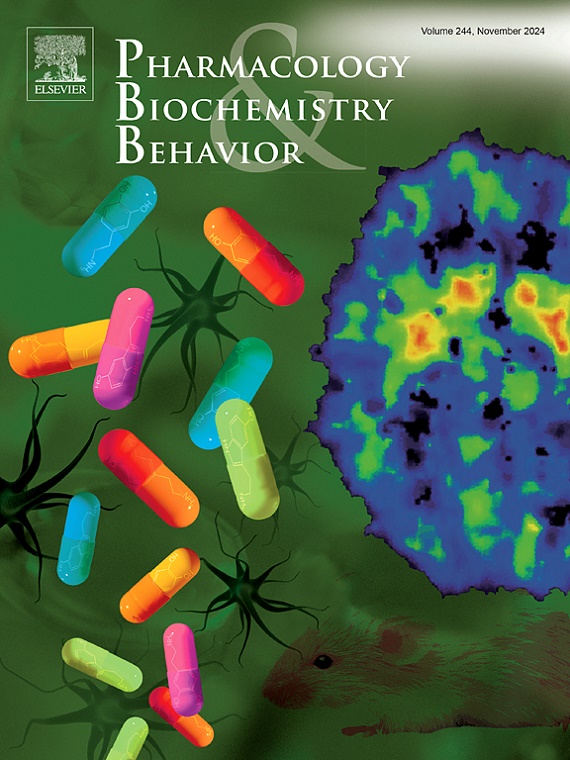Juvenile chronic social defeat stress reduces prosocial behavior in adult male mice
IF 2.5
3区 心理学
Q1 BEHAVIORAL SCIENCES
引用次数: 0
Abstract
Exposure to stress in early life can have a significant impact on individuals. However, the effects of early-life stress (ELS) on prosocial behavior remain unclear, as do the underlying mechanisms. In this study, ICR juvenile mice were subjected to juvenile chronic social defeat stress (jCSDS) between postnatal days 32 and 41, during which body weight changes were continuously monitored. The behaviors of adult mice were evaluated using the open field test (OFT), the social interaction test (SIT), and the prosocial choice task (PCT). ELISA was used to quantify serum levels of oxytocin, serotonin, and dopamine. The density of dendritic spines in the basolateral amygdala was evaluated by Golgi staining. Behavioral test results showed that jCSDS induced anxiety-like behavior and decreased prosocial selection tendency in mice. Additionally, exposure to jCSDS increased the serum levels of oxytocin, decreased those of serotonin, and increased the density of dendritic spines in the basolateral amygdala. Correlation analysis indicated that prosocial behavior was negatively correlated with serum oxytocin levels and dendritic spine density in the basolateral amygdala. These results suggested that jCSDS reduced prosocial behavior, possibly due to changes in serum oxytocin contents and adaptive changes in amygdaloid neurons.
幼鼠慢性社会失败压力会降低成年雄鼠的亲社会行为。
早期生活中的压力会对个人产生重大影响。然而,早期生活压力(ELS)对亲社会行为的影响及其潜在机制尚不清楚。在本研究中,ICR幼年小鼠在出生后第32天至第41天遭受幼年慢性社会失败应激(jCSDS),在此期间连续监测体重变化。采用开放场测验(open field test, OFT)、社会互动测验(social interaction test, SIT)和亲社会选择任务(pro - social choice task, PCT)评估成年小鼠的行为。ELISA测定血清中催产素、血清素和多巴胺的水平。高尔基染色测定杏仁核基底外侧树突棘密度。行为学测试结果显示,jCSDS诱导小鼠焦虑样行为,降低亲社会选择倾向。此外,暴露于jCSDS增加血清催产素水平,降低血清血清素水平,并增加杏仁核基底外侧树突棘的密度。相关分析表明,亲社会行为与血清催产素水平和杏仁核基底外侧树突棘密度呈负相关。这些结果表明,jCSDS降低了亲社会行为,可能是由于血清催产素含量的改变和杏仁核神经元的适应性改变。
本文章由计算机程序翻译,如有差异,请以英文原文为准。
求助全文
约1分钟内获得全文
求助全文
来源期刊
CiteScore
6.40
自引率
2.80%
发文量
122
审稿时长
38 days
期刊介绍:
Pharmacology Biochemistry & Behavior publishes original reports in the areas of pharmacology and biochemistry in which the primary emphasis and theoretical context are behavioral. Contributions may involve clinical, preclinical, or basic research. Purely biochemical or toxicology studies will not be published. Papers describing the behavioral effects of novel drugs in models of psychiatric, neurological and cognitive disorders, and central pain must include a positive control unless the paper is on a disease where such a drug is not available yet. Papers focusing on physiological processes (e.g., peripheral pain mechanisms, body temperature regulation, seizure activity) are not accepted as we would like to retain the focus of Pharmacology Biochemistry & Behavior on behavior and its interaction with the biochemistry and neurochemistry of the central nervous system. Papers describing the effects of plant materials are generally not considered, unless the active ingredients are studied, the extraction method is well described, the doses tested are known, and clear and definite experimental evidence on the mechanism of action of the active ingredients is provided.

 求助内容:
求助内容: 应助结果提醒方式:
应助结果提醒方式:


